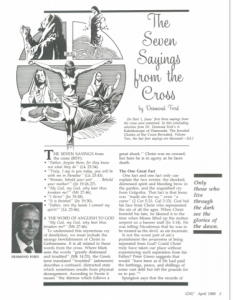The Seven Sayings from the Cross – Part 2 of 2
Jun 6, 2014 3503
by Desmond Ford
Excerpt:
[In Part 1, Jesus’ first three sayings from the cross were examined. In this concluding selection from Dr. Desmond Ford’s A Kaleidoscope of Diamonds: The Jeweled Glories of the Cross Revealed, Volume Two, the last four sayings are discussed.-Ed.]
THE SEVEN SAYINGS from the cross (RSV):
• “Father, forgive them; for they know not what they do” (Lk 23:34).
• “Truly, 1say to you today, you will be with me in Paradise” (Lk 23:43).
• “Woman, behold your son! . . . Behold your mother!” On 19:26,27).
• “My God, my God, why hast thou forsaken me?” (Mt 27:46).
• “1 thirst” On 19:28).
• “It is finished” On 19:30).
• “Father, into thy hands 1commit my spirit!” (Lk 23:46).
4. THE WORD OF ANGUISH TO GOD
“My God, my God, why hast thou forsaken me?” (Mt 27:46).
To understand this mysterious cry of dereliction, we must include the strange bewilderment of Christ in Gethsemane. It is all related to these words from the cross. Where Mark uses the words “greatly distressed and troubled” (Mk 14:33), the Greek term translated “troubled” (ademonein) describes a confused, distracted state which sometimes results from physical derangement. According to Swete it means “the distress which follows a great shock.” Christ was no coward, but here he is in agony as he faces death.
The One Great Fact One fact ard one fact only can explain the two events: the shocked, distressed spirit and bleeding brow in the garden, and the anguished cry from Golgotha. That fact is that Jesus was “made sin for us,” even “a curse” (2 Cor 5:21; Gal 3:13). God hid his face from Christ who represented the sin of all the ages. When Christ foretold his fate, he likened it to the time when Moses lifted up the molten serpent on a banner staff On 3:14). He was telling Nicodemus that he was to be treated as the devil, as sin incarnate.
Is not the worst part of sin’s punishment the awareness of being separated from God? Could Christ truly have taken our place without experiencing such separation from his Father? Peter Green suggests that would ‘ ‘have been as if He had paid the farthings, pence, and shillings of some vast debt but left the pounds for us to pay.”
Spurgeon says that the records of time and eternity do not contain a sentence more full of anguish than this fourth word from the cross. Christ had endured silently all the torment of his body, but when his Father forsook him, his great heart broke. It is not, “Why has Peter forsaken me? Why has Judas betrayed me?” These were terrible griefs, but this is the sharpest and cut him to the quick. “The sufferings of his soul were the soul of his sufferings.”
Calvary Banishes the Horror of Being Forsaken
There are times when some of us face a horror which makes the brain reel and the heart faint, “the horror of a universe without God, a universe which is one hideous, tumbling, crashing mass of confusion with no reason to guide and no love to sustain it.” At such times a glance at Calvary can steady us and perhaps even restore us. He was forsaken that we might never be. He prayed that prayer, that we might never need to. We need not suffer for our sin, for Christ has suffered in our place. Therefore, however overwhelming our grief and bewilderment, let us like Christ hold on, crying, “My God, my God … ” Hold on to the arm which only appears to be thrusting us away.
Recall the Syrian Phoenician woman to whom Christ momentarily pretended to be unsympathetic (Mk 7:24-30). Let her faith be yours also. Hold on. Nightmares never last. Tunnels have their exits. Only those who live through the dark see the glories of the dawn.
Hating Sin
Should we not hate the sin that brought such agony to him who loved us so? Shall we sin lightly because there is forgiveness with God? That would be like cutting ourselves with a knife because we have a Band-Aid. How can one who is loved so much stab the heart of the One loving? The cross is a revelation of how much our sin hurts God, and only the insensible are not anesthetized against rebellion by the sight.
The dearest idol I have known
Whate’ er that idol be,
Lord, I will tear it from its throne,
And worship only Thee.
Observe that this central word of the cross epitomizes the heart of the Atonement-Christ in our stead being treated as sin itself! Our Redeemer in his divine nature suffers infinitely for us.


Leave a Reply